- Home
- H A CULLEY
The Bastard's Crown Page 21
The Bastard's Crown Read online
Page 21
‘You, you silly child.’
Rowena sat down in a chair and put her head in her hands. ‘Do you want to marry me?’ She asked eventually.
‘More than anything in the world.’
She got up and took his hands in hers. ‘Will you give me a little more time to think about it?’
‘As long as you need.’
‘You don’t need more time, girl. You know what your heart is telling you. I only wish your father had loved me. It’s not that common you know.’ Hilda said with some asperity.
‘Mother, father did love you.’ Rowena sounded shocked.
‘In his way, I suppose; but not like the way you two love each other.’
Hugo looked at Rowena again and decided to force the issue. ‘Let me ask you a question.’ He drew a deep breath. ‘How will you feel when I ride away from here in a few days’ time?’
‘I’ll hate it. You’re right. I expect I am being pathetic.’
‘Never that but I don’t think I can stand many more months of not knowing. It’s tearing me up inside.’ Hugo was not the most patient man and he almost felt that it would be better to know now one way or the other than play the waiting game any longer.
‘I’ll give you my answer tomorrow.’ She promised.
~#~
When Hugo arrive back in Peak Cavern he was betrothed to Rowena and felt like the happiest man alive. His euphoria didn’t last long though.
‘Beorn, the man who used to be the thane of Hope, has risen in revolt and is gathering an army of supporters in the wastes of the High Peak.’ Roland told him grimly as soon as he dismounted. As he rode up the winding path to the top of the plateau above Peak Cavern Hugo had been pleased to see that the palisade around the main bailey was complete and the great hall also looked finished. The garrison had come out to greet Hugo and he noted that two appeared to be wounded. Roland saw the direction of Hugo’s glance.
‘Yes, they ambushed a patrol send out to try and find them. Those two were lucky; three more are dead.’
‘How many locals have you recruited?’ Hugo wanted to know.
‘Why none?’ Roland looked doubtful. ‘Can we trust them?’
‘We won’t survive long if we can’t.’ Was Hugo’s grim rejoinder.
With thirty local men recruited from his estates to act as guides and archers, Hugo led the garrison into the vast area of peat bog to the north of the valley in which his manors lay. His force consisted of a dozen knights, fifty men-at-arms and archers and twenty squires and servants. For what he had managed to learn by questioning the Englishmen in his force he was probably faced by about two hundred rebels. He did have a few things in his favour: Beorn had not been a popular master. He had been harsh and unpredictable so Hugo had few worries about loyalty amongst his own men. Those who Beorn had gathered to his banner were probably mainly malcontents, outlaws and robbers. His men were also better armed but they had to beware of the many areas of peat bog into which a knight mounted on a heavy horse could sink in minutes.
They camped on top of Black Hill that night and the next day Hugo sent out his scouts. About midday two came back to say that they had found Beorn’s camp near Kinder Downfall across a deep valley a few miles to the south west. On the western edge of the plateau there was a near vertical rock face down which a waterfall plunged. This was the Downfall. Hugo set off at once and by dusk he was a mile from Beorn’s camp. Just before dawn he deployed his men in an ambush position above a ten foot grough cut through the peat by a stream and sent out five knights to ride towards the rebel camp and then flee back down the grough.
The ploy worked a treat and the knights came galloping back ten minutes later followed by a horde of men on foot brandishing all sorts of weapons. Out of sight around a bend the knights wheeled their mounts and then Hugo led his dozen knights back to charge the leaders of the pursuit. At the same time the archers started to fire down into the mass of rebels below them and the men-at-arms dropped down into the grough at the rear of the rebels. It was a massacre. Perhaps fifty died in the first few minutes then Beorn managed to rally some of his men who tried to fight their way past the knights. Some of the rest had managed to scramble up the soft peat walls of the defile and started to flee across the peat bog. Quite a few were brought down by the archers and some stumbled into the areas of soft bog in their panic. Perhaps twenty managed to escape.
Beorn and his men provided hot work for the knights. Hugo cut down three of them before his horse was killed; he scrambled clear of the saddle to avoid becoming trapped under it but lost his footing; his helmet and his sword went flying as he fell. Two men loomed over him with axes as he lay there. One dropped with an arrow in his back before he could do anything and Hugo managed to raise the shield strapped to his arm as the other swordsman cut at his unprotected head. Out of the corner of his eye he saw Yves swing his sword at the man’s neck cutting so deeply into it that his head swung down like the lid of a tankard being opened and blood sprayed out coating the knight and his horse in gore. The man was dead before he hit the ground.
By the time that Hugo got to his feet it was all over. He thanked Yves and took stock on the ten prisoners who had been captured. One of his men told him that Beorn was amongst them but he was so badly wounded that he would be lucky to make it to trial.
Unbelievably Hugo’s only casualties had been three archers and four men-at-arms who had been killed when the fleeing rebels gained the top of the defile and two knights who had been wounded. Ralph brought up Hugo’s courser and the squire rode double on Sweyn’s rouncey for the journey back into the valley.
It wasn’t until Hugo was back in the castle and Ralph went to help him off with his hauberk that he realised that he must have broken several ribs during the fight. He just hoped that he would be fit enough to ride back down to Burneham for his wedding in July.
Chapter Nine – Massacre in the North 1069 to 1070 A.D.
Baldwin FitzWarren rode out of York in early January 1069, one of over seven hundred knights, squires and sergeants in the train of the new Earl of Northumbria, Robert de Comyn. Baldwin was twenty one and probably the youngest knight in the force being sent north to subdue the area after the rebellion of the previous earl, Gospatric, in 1068. Gospatric had fled to Scotland but there were other Anglo-Danish claimants to the earldom to challenge the new earl. In any case Northumbria had long been an unwilling province within England and many of the population still hankered after independence.
The day was clear and sunny but bitterly cold in the strong easterly wind. As the day wore on the frozen track they were following started to melt, becoming muddy and slippery. By the time that they arrived at Durham three days later they were tired, cold and in poor humour. This wasn’t helped by the fact that most were Norman, French and German adventurers who had crossed to England in the wake of King William’s coronation seeking plunder. De Comyn was a Flemish lord who had little in common with them and consequently there was little loyalty felt by either side to bond them together.
Baldwin was the fourth son of a minor baron who held a number of estates near Rouen. He had little or no prospect of inheriting with three elder brothers, two of whom had sons of their own, so he had decided to join de Comyn after being knighted the previous year.
They were welcomed by Æthelwine, the bishop of Durham, but the townspeople greeted their arrival with thinly veiled hostility. Most were Anglo-Danes who felt little allegiance to the king, especially a Norman one. Such a reception did little to endear them to the weary knights.
Durham sat on top of a hill above the River Wear. Although only protected by a stockade the steep approaches on all sides made the town easily defensible. The buildings were constructed of timber or wattle and daub except for the White Church, built as part of the monastery, and the bishop’s house, a fairly modest single story building standing a little apart from the monastery.
The bishop invited Robert de Comyn to stay with him, together with his captain and their two squires. The
rest were billeted in the town as guests of the unwilling population. Like the rest of de Comyn’s men, the one thing Baldwin wanted after such an unpleasant journey was a good evening’s roistering in a tavern and to bed a girl afterwards. Baldwin quickly became aware that things were getting out of hand though. Fights broke out with the locals, especially when a Norman took a fancy to someone’s daughter or wife in the street or in the house where they were billeted.
Baldwin decided that he had better let the earl know that things were turning ugly and set off through the streets to the bishop’s house. He hadn’t gone very far when he was set upon by three men armed with daggers. Fortunately he hadn’t drunk much and was able to draw his sword and defend himself. When the first lunged at him Baldwin swept his sword down and cut the man’s hand off at the wrist. As the man fell to the ground screaming Baldwin felt a blow between his shoulder blades. Another man had tried to knife him in the back but the blade didn’t penetrate the chain mail hauberk he was wearing. He lunged and drove his sword into the chest of the third man but then had trouble in pulling it out again as it was caught between two ribs. By the time he had turned to face the attacker who had tried to stab him in the back the man had fled.
Baldwin set off towards the earl again but then noticed flames shooting up from that direction. Hearing the sound of many feet behind him he drew back into a narrow alleyway. Two minutes later a large party of men ran past him. They were all armed and looked to be Anglo-Danes. Baldwin retraced his steps cautiously to the hovel where he was staying with another knight and their two squires. When he arrived he could hear the sounds of a struggle inside which suddenly ceased with a cry so he threw the door wide and peered into the gloom lit only by the dying embers in the central hearth.
Suddenly a shape threw itself at Baldwin, who instinctively brought up his sword. There was a clash of steel as it met another sword. He backed into the street where there was at least some moonlight. Their host and his son came tumbling out of the house wielding a sword and an axe respectively. They might have been odds of two to one but they weren’t particularly skilful. He parried the next sword thrust and turned his wrist to force his opponent’s blade towards the ground. At the same time he kicked out at the youth wielding the small axe and connected with his groin. Leaving the lad writhing and moaning on the ground he parried another clumsy thrust and punched the man hard on the nose with his gauntleted hand. The man dropped his sword and clutched at his ruined face just as Baldwin brought his blade down to split his skull open. The youth was still doubled over in agony clutching his groin so Baldwin chopped down again severing his spinal cord.
He stepped back into the hovel and shut the door. He fumbled around for a second or two before finding a taper and lit it from the embers. Once he had lit a candle he could see what he feared to find. The other knight’s fifteen year old squire lay in a corner with his throat cut. His own squire, who had turned fourteen a week before he joined him at York, had been stabbed to death. It was then that he noticed to his horror that both boys had been mutilated: their genitals had been hacked off and stuffed in their mouths.
After he had been sick Baldwin went looking for the man’s wife. He found her hiding in the roof space and was glad when she attacked him with a kitchen knife. He felt no compunction at all in killing her, especially after he noticed the blood on the knife’s blade. She must have been party to what had happened to the two young squires.
He quickly collected his gear and put on his helmet then, checking that there was still no-one outside, he slipped round to the back of the hovel where the horses were stabled. He was damned if he was going to leave his rouncey behind so saddling it and his courser, he mounted up and led the other horse down the hill towards the gates. He could now hear the sound of fighting coming from his left and behind him. The flames from the bishop’s house cast a ruddy glow in the starry sky at the very top of the hill. Luckily the flames were behind him and so would partially blind anyone he ran into.
Halfway to the gates he came across two other knights battling more than half a dozen well-armed men. Letting go of the palfrey’s lead rein he charged into them cutting two down before they realised what was happening. Having distracted the rest, the two knights on foot managed to wound two more but, just as the rest fled, a man managed to thrust his sword into the eye socket of one of the Normans. The other knight cut the assailant down, but too late; his companion was dead.
The two men could hear pounding feet so the surviving knight swung into the saddle of the rouncey and he and Baldwin cantered off down the steep street to the gates. These stood wide open, presumably having been left like that after admitting the armed Anglo-Danes.
After two days of hard riding the two knights arrived at York. There they discovered that they were the first to arrive with the news of the massacre and, as the days passed, they realised to their dismay that they were the only ones to escape.
~#~
Hugo was thoroughly enjoying married life. His days consisted of sitting in judgement, visiting his manors, hunting and, his favourite pastime, riding over the moors with his wife. His nights were spent in even more pleasurable pursuits. Life, if not idyllic, was something very much like it.
It therefore came as something of a shock when he received the news about Durham. Edgar the Atheling and Gospatric, the previous earl of Northumbria, had marched south from Scotland to join the revolt and had been welcomed by the people of York. The only good news was that the newly built castle with its Norman garrison still held out.
It came as no surprise when Hugo was told to report to the muster with two knights and thirty men. Those who served him as the deputy shire reeve were to remain at Peak Cavern in case of trouble whilst the army was in the North. Leaving Emery le Gros in charge he took Roland and Yves with him. Ralph was now nineteen and Sweyn twelve. In two years’ time he would knight Ralph and make Sweyn his squire. He also planned to knight both Oswin and Wulfric when he was next in Burneham but he admitted to himself that he was a little concerned about how the elevation of Saxons in this way would be received by his fellow countrymen.
Cerdic had proved to be a very capable steward and had settled happily into his new role. Siward was something of a problem though. He had taken the news that he was no longer betrothed to Rowena very badly and had cursed Hugo and his father for betraying him, as he saw it. He had sulked and then he had taken it into his head that his honour demanded that he challenged Hugo to a fight.
At this Hugo’s patience had worn thin. Hugo sent for the boy and with his father standing uncomfortably behind him, he tore into him.
‘You may have been the heir to a manor once boy, but you are now a penniless Saxon peasant dependent on the charity of others. Your father is a good steward and I am glad that I employed him but there are plenty more out there and any more of this nonsense and I will dismiss him and let the two of you fend for yourselves.’ The two glared at each other: Hugo with anger and Siward with resentment.
Hugh softened his tone. ‘I realise that it is hard for you to see the Lady Rowena every day and so, in the circumstances, I have arranged for you to go to a friend of mine in London who is a king’s commissioner. His name is Gilbert; you will have met him when he came with me to Burneham. He will enrol you in Westminster Abbey as a scholar until you are old enough to start work as a junior clerk.’ He looked at the deflated boy. ‘You may go.’
Cedric led his snivelling son from the hall telling him that he had brought this on himself but that it was a wonderful opportunity. The boy didn’t seem convinced. Hugo watched Siward leave with his father and wondered why it was that he seemed to earn the enmity of small boys. Mind you, he thought to himself, Robert de Belleme wouldn’t be that small any more: he must be fourteen by now.
By early April Hugo was encamped with the king’s army outside York. Edgar the Atheling and the two former earls, Gospatric and Edgar, had fled back to Scotland and William ordered a second castle built to keep York under control.
Hugo was on his way back to his lines one evening when he came face to face with de Belleme coming out of the king’s tent. The boy had grown and filled out since their last meeting at Domfront four years previously but he hadn’t lost his mean and spiteful demeanour.
‘You.’ The boy spat reaching for his dagger.
‘What are going to de Belleme? Do you think you can kill an armed and armoured knight with a puny dagger?’ It probably wasn’t the wisest move to provoke a haughty youth like de Belleme but Hugo couldn’t resist it.
The squire straightened up and let go of his dagger. ‘No, I don’t need to. I am one of the king’s squires now and have his ear.’ He boasted. ‘I’ll get you stripped of your lands and sent back to your hovel in Maine, where you belong.’
For a second the boy stood there glaring at Hugo de Cuille aggressively then a blow round his head sent him spinning.
‘Unproven boys don’t threaten knights where I come from, boy.’ William FitzOsbern, now the earl of Hereford, had come out of the king’s tent behind him and had heard the exchange. ‘Now go and deliver the message the king gave you.’ He turned to Hugo. ‘You seem to have well and truly earned his enmity Hugo. He’s a nasty customer; I warned William not to take him on as a squire but he did it as a favour to his parents.’
He watched the boy depart then turned back to Hugo. ‘In any case he will be leaving with the king tomorrow; there’s trouble in the West which William needs to deal with before it gets out of hand. I’m staying here to see the second castle built and to ensure the area is pacified. I’d like you to stay with me, and not just to put some distance between you and de Belleme.’
A week later he sent Hugo north with a conroi of knights and forty mounted sergeants with orders to see whether the rebels had dispersed and whether the way to Durham now lay open. Hugo advanced with a screen of twenty sergeants in small groups in front of the main body. Then came the knights, the squires leading the packhorses and finally twenty more sergeants as the rear guard. Hugo had got as far as Northallerton when his scouts came back to report that they had seen a large force advancing towards them. Hugo rode forward to see for himself. The past week or so had been dry and there was no mistaking the cloud of dust swirling in the air. It could only have been produced by thousands on the march.

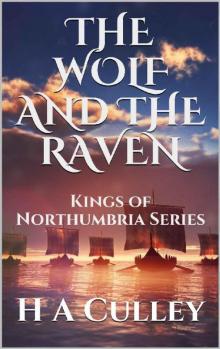 The Wolf and the Raven
The Wolf and the Raven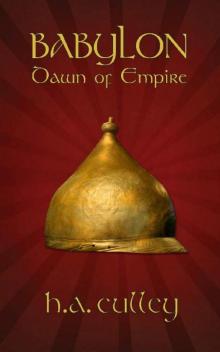 Dawn of Empire
Dawn of Empire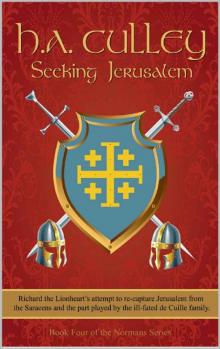 Seeking Jerusalem
Seeking Jerusalem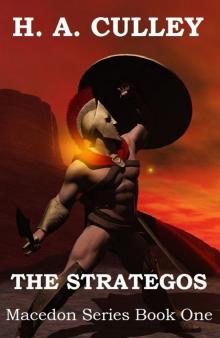 The Strategos
The Strategos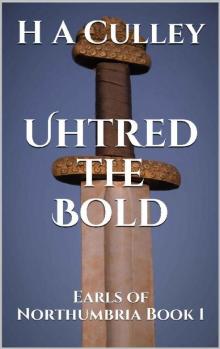 Uhtred the Bold
Uhtred the Bold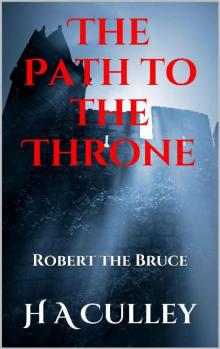 The Path to the Throne
The Path to the Throne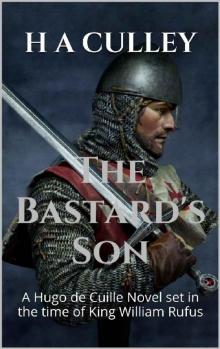 The Bastard's Son
The Bastard's Son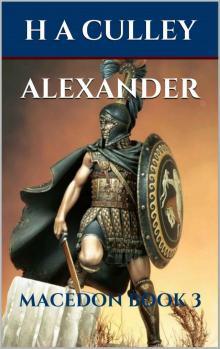 Alexander
Alexander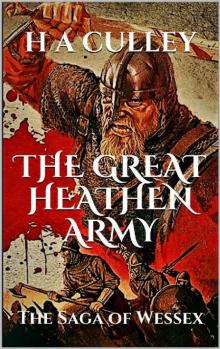 The Great Heathen Army
The Great Heathen Army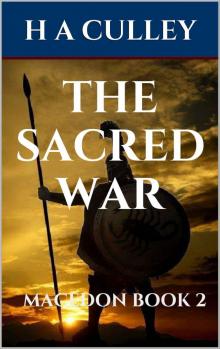 The Sacred War
The Sacred War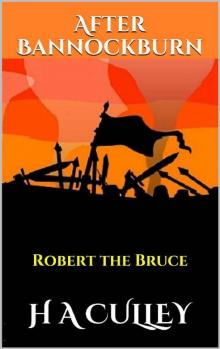 After Bannockburn
After Bannockburn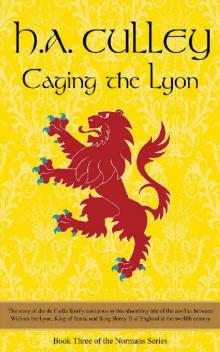 Caging the Lyon
Caging the Lyon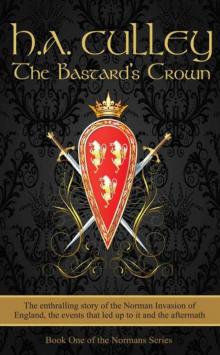 The Bastard's Crown
The Bastard's Crown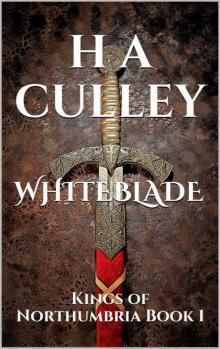 WHITEBLADE
WHITEBLADE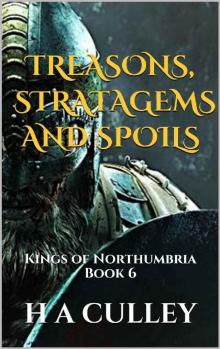 TREASONS, STRATAGEMS AND SPOILS: Kings of Northumbria Book 6
TREASONS, STRATAGEMS AND SPOILS: Kings of Northumbria Book 6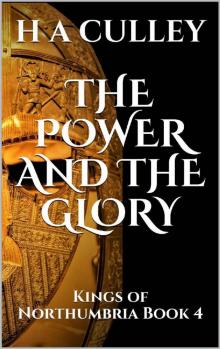 THE POWER AND THE GLORY: Kings of Northumbria Book 4
THE POWER AND THE GLORY: Kings of Northumbria Book 4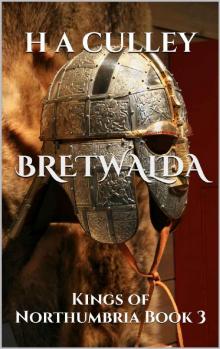 BRETWALDA: Kings of Northumbria Book 3
BRETWALDA: Kings of Northumbria Book 3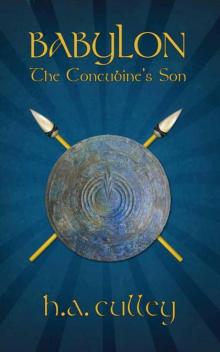 The Concubine's Son
The Concubine's Son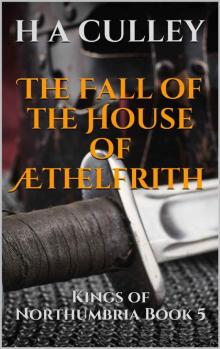 The Fall of the House of Æthelfrith: Kings of Northumbria Book 5
The Fall of the House of Æthelfrith: Kings of Northumbria Book 5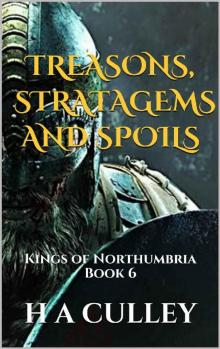 TREASONS, STRATAGEMS AND SPOILS
TREASONS, STRATAGEMS AND SPOILS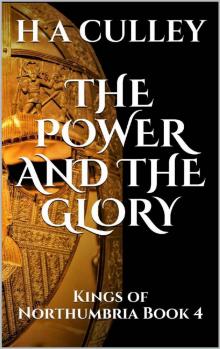 THE POWER AND THE GLORY
THE POWER AND THE GLORY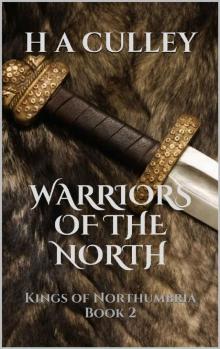 WARRIORS OF THE NORTH
WARRIORS OF THE NORTH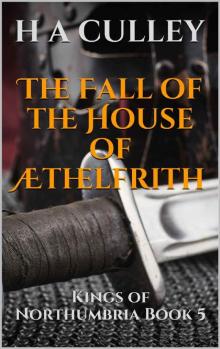 The Fall of the House of Æthelfrith
The Fall of the House of Æthelfrith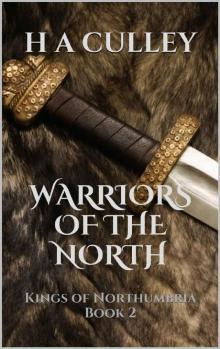 WARRIORS OF THE NORTH: Kings of Northumbria Book 2
WARRIORS OF THE NORTH: Kings of Northumbria Book 2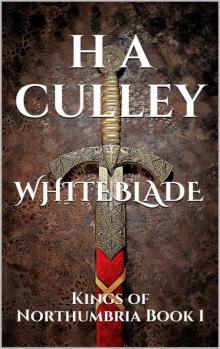 WHITEBLADE: Kings of Northumbria Book 1
WHITEBLADE: Kings of Northumbria Book 1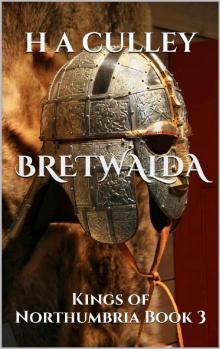 BRETWALDA
BRETWALDA